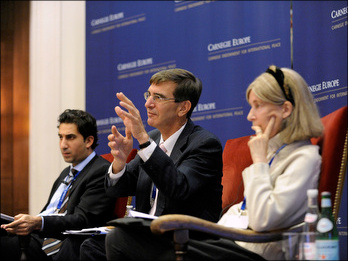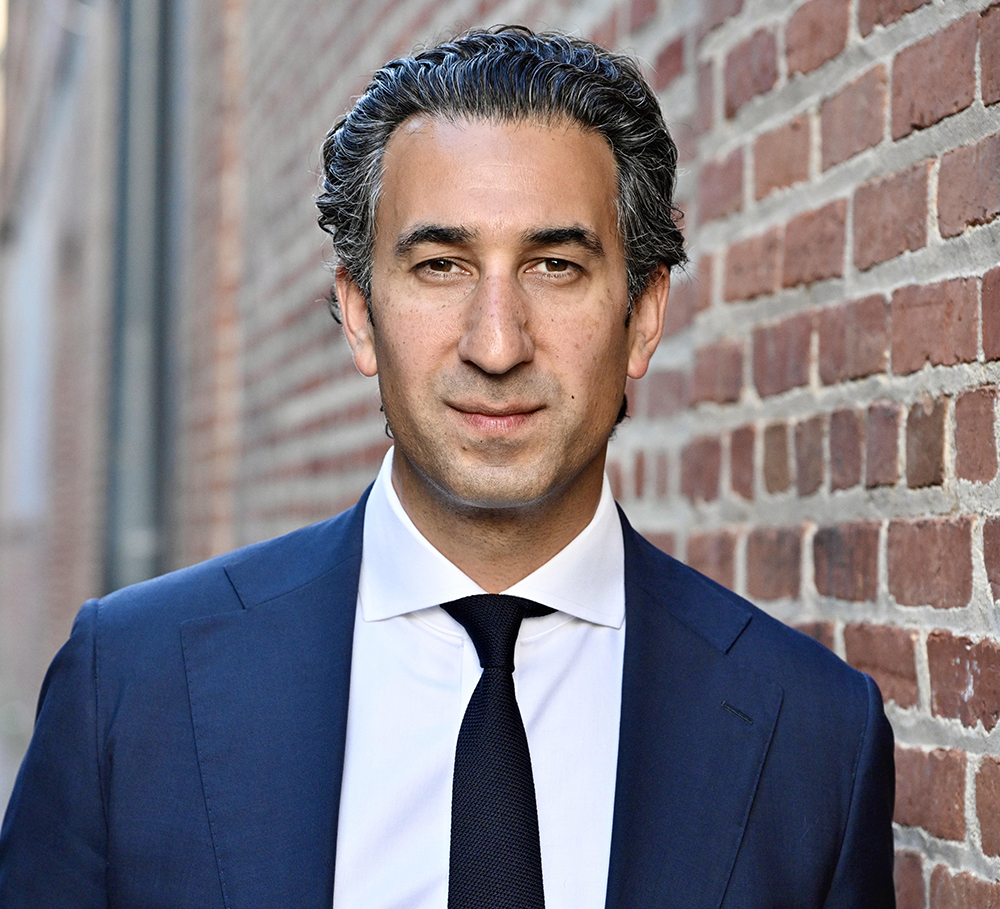{
"authors": [
"George Perkovich",
"Karim Sadjadpour",
"Thérèse Delpech"
],
"type": "event",
"centerAffiliationAll": "",
"centers": [
"Carnegie Endowment for International Peace",
"Carnegie Europe"
],
"collections": [
"Europe’s Southern Neighborhood"
],
"englishNewsletterAll": "",
"nonEnglishNewsletterAll": "",
"primaryCenter": "Carnegie Endowment for International Peace",
"programAffiliation": "",
"programs": [],
"projects": [],
"regions": [
"North America",
"United States",
"Middle East",
"Iran"
],
"topics": [
"Military",
"Foreign Policy",
"Nuclear Policy",
"Nuclear Energy"
]
}
Iran: A Test-Case for A New U.S. Administration and Its International Partners
Fri, October 3rd, 2008
Brussels
In the breakfast session of Carnegie Europe’s New Vision Conference: Post-Bush America and the World, Carnegie experts discussed how the new U.S. administration and its international partners should address the Iran crisis.
Participants included George Perkovich, Vice President for Studies of the Carnegie Endowment, Thérèse Delpech, Director for Strategic Studies at the Atomic Energy Commission of France, and Karim Sadjadpour, Associate at the Carnegie Endowment.
Six Recommendations for Engagement
Karim Sadjadpour pointed out that although Iran can be an emotional issue for people, it is critical to look at it clinically. The U.S. debate about whether or not to engage Iran is not constructive. Iran is central to many of the most important global issues: Iraq, Afghanistan, Arab-Israeli conflict, Energy Security, Terrorism. The relevant question is not whether the U.S. should engage Iran, but how. Central to that answer is understanding whether Iran behaves the way it does because of U.S. actions or vice versa.
Sadjadpour laid out six recommendations for the next U.S. administration on how to successfully engage Iran:
First, get the timing right. The next U.S. president will be inaugurated in January 2009, but the next Iranian presidential election will take place in June 2009. Nothing should be done until June. Otherwise, it is likely that U.S. actions will improve Ahmadinejad’s chances for reelection, which in turn would limit opportunities for progress.
Second, the U.S. and Iran should build confidence on issues of common interest. At the moment, relations are based on a deep lack of trust. Both countries can build trust by acting together on issues in which they share common interests, like Afghanistan and Iraq.
Third, deal with the real power brokers in Tehran. The U.S. should respond to the rightwing shift in Iran that has led to the creation of what is essentially a one party system.
Fourth, speak softly. Iran knows about the ‘big stick;’ it knows that the U.S. is capable of inflicting harm. Overt threats of war, on the other hand, increase the price of oil, which strengthens the negative elements in the regime. The next administration needs to make sure that it does not do anything that strengthens Iran.
Fifth, do not let entrenched bureaucrats set the grounds for the relationship. There are some who do not see it in their interests to improve the U.S.-Iran relationship. Many in the Iranian government would rather not see the government reformed. Sadjadpour called these people ‘weeds that only grow in the dark.’ Their success is based on the current system of government and change would diminish their power.
Sixth, create a united international approach. Addressing Iran is not something that the U.S. can do on its own. Iran is adept at finding gaps between key nations.
Sadjadpour concluded that it was not his intention to sound like a cold-blooded realist. The problem is simply the character of the government in Iran. Supreme Leader Khamenei understands better than most that his survival is tied to Iran’s continued isolation.
Problems with the Current Strategy
Thérèse Delpech observed that the West has been speaking softly with Iran since 2002 or 2003 and that it has come to no good. Speaking so softly has meant that Iran ‘laughs’ at us. She agreed with Sadjadpour that the current Iranian regime thrives in isolation but argued that this means it is imperative that the U.S. act as quickly as possible to thwart its nuclear ambitions. A new Iranian president in 2009 is unlikely to make much difference.

The current approach is not working, Delpech continued. The international community has reached the end of the UN Security Council resolution process. The new resolution only serves to underline the fact that previous resolutions have not been implemented. She questioned whether the ailing Iranian economy is due to trade sanctions or simply because it is ineptly managed by Ahmadinejad’s government.
Delpech also observed that the International Atomic Energy Agency (IAEA) has treated Iran softly. The relationship is reaching a dead end because there has been no Iranian response. In particular, there was no reaction from Iran at the last meeting of the IAEA board of governors. Although the evidence that Iran is not complying with nuclear non-proliferation measures is not absolute, Delpech questioned what kind of evidence would be considered enough for the world to take action.
Delpech argued that EU 3 and P5 +1 process have both reached a dead end. The recent meeting in Geneva represented a new chance for participation but the Iranian negotiator failed to engage in meaningful negotiation. Iran is under the the impression that because the West is divided on how to address the nuclear issue, it has free reign in to pursue nuclear development without giving anything up in the process. Iranian national newspapers have published as much.
Iran expects more of the same from the U.S.: delay and incremental sanctions. They expect that a new U.S. president will start a new round of negotiations, which will give them more time. If the next administration pursues this path, we should expect a big foreign policy failure at the beginning of the new term.
The Iranian nuclear program is dangerously close to completion and time is of the essence. It is highly likely that there is going to be an inescapable war. According to Delpech, the West is running out of options fast.
Weaponization and the Threat of Force
In response to a question about whether we should take the IAEA studies about Iranian nuclear proliferation seriously, or whether we should heed Iranian claims that they are false, Delpech explained that both the IAEA and the Iranians are taking the study very seriously. But the only uequivocal evidence of Iran's nuclear arsenal would be a nuclear explosion, and the question is whether we really want to reach that point.
Perkovich added that Iranian claims of falsification are probably attempts to undermine U.S. credibility. He went on to say that some would not be against Israel bombing Iran, but focusing on that scenario distracts policy makers from focusing on the evidence.
Gareth Evans of the International Crisis Group contributed to the discussion by saying that there were four things making Iran cautious about crossing the red line into weaponization.
First, Israel will respond with U.S. support if Iran produces even one bomb.
Second, any tacit support from Russia and China will be lost.
Third, there is the prospect of very heavy sanctions.
Fourth, Egypt, Saudi Arabia and Turkey will rapidly move into the nuclearization process if Iran does cross that red line.
Evans argued that there needs to be an agreement on exactly what that red line is. There is nothing the world can do about delaying weaponization. But we need to make sure that Iran understands that if it does cross the internationally defined red line, there will be tremendous economic sanctions as well as very real military actions.
Robert Cooper from the Council of the European Union explained that it is his opinion that the threat of force is the only option. It is unlikely that Iran worries about Israeli force, and it will become less and less of a threat as their military program improves. Furthermore, an attack from Israel would have the possible side effect of strengthening Iran, making it a hero in the Middle East. The West needs to make more use of sanctions, and if it does not, force will become the likely option.
Cooper believed that the U.S. elections would make a positive difference. The current U.S. government has very little credibility. If among the first things that the U.S. asks of its interlocutors (Russia, China, India) is for heavy sanctions against Iran, then it will have a very real impact.
In response to Evans’ point that there needs to be a red line, Cooper explained that there already is a very clear red line, the Nuclear Non-Proliferation Treaty (NPT). To re-draw a red line that allows Iran to pursue any form of a nuclear program would be completely against the NPT.
Looking to the Future
Jessica T. Mathews, President of the Carnegie Endowment, observed that engagement with Iran is necessary, but likely to fail. Regardless, it would demonstrate that U.S. had atleast tried to engage, and would allow time to repair its relationship with Russia. The Iranian issue will not be solved without U.S.-Russian negotiations – and it would be worth the U.S. going so far as to give up the Polish missile defense system to reach that point.

Sadjadpour responded by stating that the next U.S. president will have a clean slate. That clean slate should be utilized to solve the issue rather than to come up with creative sanctions. The nuclear issue is a symptom of the U.S.-Iran issue, not the problem itself. If the West focuses solely on the nuclear issue then nothing will be resolved.
The problem in Iran is the character of the regime. If the West bombs Iran, it will entrench the worst aspects of the regime. In tackling regime change, the West should pay more attention to keeping oil prices low. As oil prices increase, the regime strengthens, if prices decrease, the regime becomes weaker. There is a clear correlation between Iranian foreign policy and the price of oil. They are much more willing to negotiate when the price of oil is low.
Delpech concluded by stating that despite the fact that the Europeans have been very mindful of each of their actions in an attempt not to enflame radicalism in Iran, the European consistently make mistakes with Iran. Redrawing a red line and making it permanent would have very little effect. The West has moved the red line too much for too many years. It would be impossible to convince the Iranians that this time it is serious.
Negotiating with Russia, Delpech explained, would also not work in lieu of the crisis in Georgia. The Russians are no longer convinced themselves that it is in their interest to block the development of an Iranian nuclear weapon. Delpech closed by saying that the West should be serious about sanctions. The fact that the West is not serious means that it is headed in the direction of the two worst scenarios: war and a bomb.
Carnegie does not take institutional positions on public policy issues; the views represented herein are those of the author(s) and do not necessarily reflect the views of Carnegie, its staff, or its trustees.
Event Speakers
George Perkovich is the Japan Chair for a World Without Nuclear Weapons and a senior fellow in the Carnegie Endowment for International Peace’s Nuclear Policy Program. He works primarily on nuclear deterrence, nonproliferation, and disarmament issues, and is leading a study on nuclear signaling in the 21st century.
Karim Sadjadpour is a senior fellow at the Carnegie Endowment for International Peace, where he focuses on Iran and U.S. foreign policy toward the Middle East.
Thérèse Delpech

